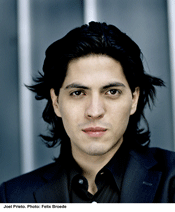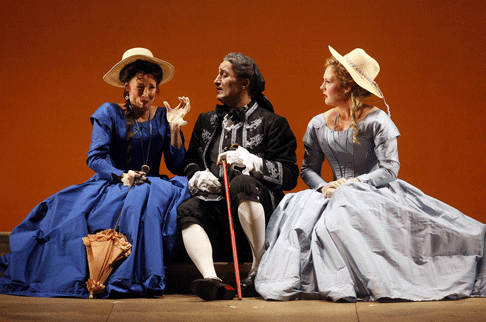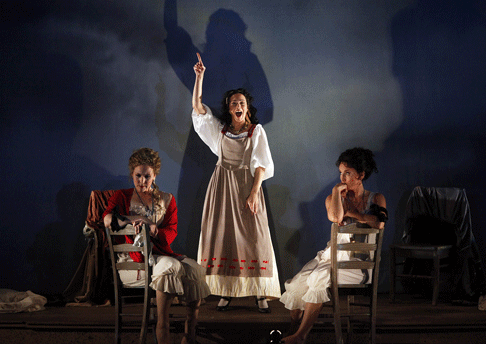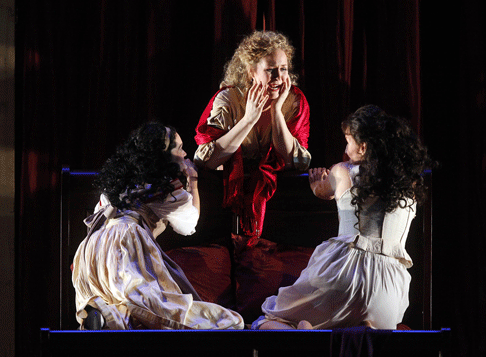![Dorabella (Patricia Risley) and Fiordiligi (Caitlyn Lynch) [Photo courtesy of Palm Beach Opera]](http://www.operatoday.com/_MG_6604.gif)
06 Mar 2011
Così fan tutte, Palm Beach
Little is known about the extent to which Mozart and Da Ponte collaborated on the libretto for Così fan tutte.
English Touring Opera are delighted to announce a season of lyric monodramas to tour nationally from October to December. The season features music for solo singer and piano by Argento, Britten, Tippett and Shostakovich with a bold and inventive approach to making opera during social distancing.
This tenth of ten Live from London concerts was in fact a recorded live performance from California. It was no less enjoyable for that, and it was also uplifting to learn that this wasn’t in fact the ‘last’ LfL event that we will be able to enjoy, courtesy of VOCES8 and their fellow vocal ensembles (more below …).
Ever since Wigmore Hall announced their superb series of autumn concerts, all streamed live and available free of charge, I’d been looking forward to this song recital by Ian Bostridge and Imogen Cooper.
Although Stile Antico’s programme article for their Live from London recital introduced their selection from the many treasures of the English Renaissance in the context of the theological debates and upheavals of the Tudor and Elizabethan years, their performance was more evocative of private chamber music than of public liturgy.
Evidently, face masks don’t stifle appreciative “Bravo!”s. And, reducing audience numbers doesn’t lower the volume of such acclamations. For, the audience at Wigmore Hall gave soprano Elizabeth Llewellyn and pianist Simon Lepper a greatly deserved warm reception and hearty response following this lunchtime recital of late-Romantic song.
For this week’s Live from London vocal recital we moved from the home of VOCES8, St Anne and St Agnes in the City of London, to Kings Place, where The Sixteen - who have been associate artists at the venue for some time - presented a programme of music and words bound together by the theme of ‘reflection’.
'Such is your divine Disposation that both you excellently understand, and royally entertaine the Exercise of Musicke.’
‘And there was war in heaven: Michael and his angels fought against the dragon; and the dragon fought and his angels, And prevailed not; neither was their place found any more in heaven … that old serpent … Satan, which deceiveth the whole world: he was cast out into the earth, and his angels were cast out with him.’
There was never any doubt that the fifth of the twelve Met Stars Live in Concert broadcasts was going to be a palpably intense and vivid event, as well as a musically stunning and theatrically enervating experience.
‘Love’ was the theme for this Live from London performance by Apollo5. Given the complexity and diversity of that human emotion, and Apollo5’s reputation for versatility and diverse repertoire, ranging from Renaissance choral music to jazz, from contemporary classical works to popular song, it was no surprise that their programme spanned 500 years and several musical styles.
The Academy of St Martin in the Fields have titled their autumn series of eight concerts - which are taking place at 5pm and 7.30pm on two Saturdays each month at their home venue in Trafalgar Square, and being filmed for streaming the following Thursday - ‘re:connect’.
The London Symphony Orchestra opened their Autumn 2020 season with a homage to Oliver Knussen, who died at the age of 66 in July 2018. The programme traced a national musical lineage through the twentieth century, from Britten to Knussen, on to Mark-Anthony Turnage, and entwining the LSO and Rattle too.
With the Live from London digital vocal festival entering the second half of the series, the festival’s host, VOCES8, returned to their home at St Annes and St Agnes in the City of London to present a sequence of ‘Choral Dances’ - vocal music inspired by dance, embracing diverse genres from the Renaissance madrigal to swing jazz.
Just a few unison string wriggles from the opening of Mozart’s overture to Le nozze di Figaro are enough to make any opera-lover perch on the edge of their seat, in excited anticipation of the drama in music to come, so there could be no other curtain-raiser for this Gala Concert at the Royal Opera House, the latest instalment from ‘their House’ to ‘our houses’.
"Before the ending of the day, creator of all things, we pray that, with your accustomed mercy, you may watch over us."
The doors at The Metropolitan Opera will not open to live audiences until 2021 at the earliest, and the likelihood of normal operatic life resuming in cities around the world looks but a distant dream at present. But, while we may not be invited from our homes into the opera house for some time yet, with its free daily screenings of past productions and its pay-per-view Met Stars Live in Concert series, the Met continues to bring opera into our homes.
Music-making at this year’s Grange Festival Opera may have fallen silent in June and July, but the country house and extensive grounds of The Grange provided an ideal setting for a weekend of twelve specially conceived ‘promenade’ performances encompassing music and dance.
There’s a “slide of harmony” and “all the bones leave your body at that moment and you collapse to the floor, it’s so extraordinary.”
“Music for a while, shall all your cares beguile.”
The hum of bees rising from myriad scented blooms; gentle strains of birdsong; the cheerful chatter of picnickers beside a still lake; decorous thwacks of leather on willow; song and music floating through the warm evening air.
![Dorabella (Patricia Risley) and Fiordiligi (Caitlyn Lynch) [Photo courtesy of Palm Beach Opera]](http://www.operatoday.com/_MG_6604.gif)
Little is known about the extent to which Mozart and Da Ponte collaborated on the libretto for Così fan tutte.
There is no mistaking the Austrian musical polyglot’s imprint on the story’s sarcastic similes, sharp allusions, and knowing winks however. Yet, for all his life, Mozart experienced the world in a musical bubble; how did he develop the keen sense of insight into human behavior that would lead to producing works like Così?
Though we have a picture of a child with a sensitivity to music that was awe-inspiring, there is also a gestalt view of a child extraordinarily observant and attentive, with the instincts of a savant. This is probably the way Mozart experienced the social world, through the lives of others. If Così is any indicia, he found great amusement in what he witnessed.
 Joel Prieto [Photo by Felix Broede courtesy of Universal Music Classical Management & Productions]
Joel Prieto [Photo by Felix Broede courtesy of Universal Music Classical Management & Productions]
In his adult life, Mozart was at the receiving end of vicious political
jockeying and nasty pettiness he had no interest in mirroring. He still had an
unquenchable thirst for living, seeking outlets for his energies and potential.
In music, he found the only muse that would woo him. That tireless love for
music probably killed him, but before it did, he would have his fun attending
to and making it.
Mozart has gotten more attention recently from Palm Beach Opera. Così fan tutte, last seen here in 1998, completes PBO’s “Mozart-Da Ponte trilogy”; Le Nozze di Figaro and Don Giovanni were part of the company’s 2009 and 2010 seasons respectively. Two United States debuts highlight PBO’s second cast opening of Così on February 26th.
In his first opera conducting assignment in North America, Gianluca Martinenghi and orchestra distinguished themselves right from the overture with playing of the utmost delicacy, and sensitivity to Mozart’s score. This pattern held and generalized to the vocal department, buoying up and stimulating singing. A regular in some top theaters in Italy, the conductor’s pacing gave singers the prerogative to explore Da Ponte’s text. The playing did fall cold at the odd moment, but at the bridge to “Un Aura Amorosa” and for Fiordiligi’s second act aria, there was sufficient musical heat. Bruce Statsyna provided not simply chords, but accent notes, arpeggios, and runs underneath the vocal line on a healthy harpsichord.
 Dorabella (Patricia Risley), Fiordiligi (Caitlyn Lynch) and Don Alfonso (Matteo Pierone)
Dorabella (Patricia Risley), Fiordiligi (Caitlyn Lynch) and Don Alfonso (Matteo Pierone)
Joel Prieto had regular work in Europe before winning Operalia in 2008. His breakout came after that competition though, as he has appeared at Covent Garden, the Liceu, Stuttgart, and the Salzburg Festival. In his North American opera debut here, the Spanish born, Puerto Rican bred tenor left one wanting more. Prieto is building a characterization of Ferrando as that of a shy but curious fellow, one for which Mozart’s music is especially suited. Of the music, Prieto’s performance tended toward caution; “Un Aura Amorosa” was unexceptional but for the shading of the second stanza; at that point, and occasionally later, he sang with the kind of affinity for this music that has garnered him (much-too-early) comparisons with golden age aristocratic tenors. His tenor’s quality — amber hued and full, with an attractive fresh sheen — and size were bare in “Ah! Io veggio quell’anima bella.”
Caitlyn Lynch also took some time to warm up to Fiordiligi, achieving a “Per pieta, ben mio perdona” of unexpected commitment and feeling. Comedic points were hers (and Steven Lawless’) for departing the stage after the first part of “Come scoglio” and then reentering grandly for its concluding verse. PBO favorite Patricia Risley has the sort of creamily textured mezzo — however gummy the diction — and alluring physical presence that can shift the axis of focus in any performance; in this case the axis of Così’s “school for lovers” turned often to her Dorabella. The Guglielmo of Andrew Schroeder was especially susceptible to fading into the background in this production, though his resonant baritone would not go unnoticed. Matteo Pierone’s Don Alfonso began to take shape in the quintet — the highpoint of this Così’s ensemble singing — that closes Act One. From there on, his Alfonso played narrator, observing and commenting from the wings. As Despina, Abigail Nims’ impact was felt as a mysterious, masked dottore and later as a twitchy notary.
 Fiordiligi (Caitlyn Lynch), Despina (Abigail Nims) and Dorabella (Patricia Risley),
Fiordiligi (Caitlyn Lynch), Despina (Abigail Nims) and Dorabella (Patricia Risley),
PBO’s chorus, under the direction of Greg Ritchey, created rich and sonorous music from offstage, emerging only for the civil ceremony.
Stephen Lawless’ permutation on Così’s magnet-as-poison-antidote theme was a kite-and-key electric conductor that had Ferrando and Guglielmo writhing and shuddering. Lawless moved the action upstage, in front of a scrim curtain of clouds as Alfonso re-pontificated to Ferrando and Guglielmo — their backs to the audience — “così” across Ferrando’s ear, “fan” across Guglielmo’s and “tutte” out into the theater. It is in the civil ceremony that Lawless’ stage direction hit a high-water mark that stayed mostly unbroken through much of Act Two. The scene included an action-stopping moment and then scurrying chorus members as the marriage contracts were signed. To close the opera, Fiordiligi and Dorabella crossed each other in confusion over which swain to go to in “Fortunate L’uom.”
 Despina (Abigail Nims), Fiordiligi (Caitlyn Lynch) and Dorabella (Patricia Risley)
Despina (Abigail Nims), Fiordiligi (Caitlyn Lynch) and Dorabella (Patricia Risley)
On loan from Atlanta Opera, Peter Dean Beck’s sets remember Classical Roman civilization and Naples; there are statues and columns and the sorelli are transplanted from their room to tanning on lounge chairs under an umbrella at a sun-soaked beach (Lighting by Michael Baumgarten). For a model of costume (owned by Atlanta Opera also) pragmatism we go to the final scene — designers at Malabar Ltd. cloak the “Albanians” in desert-beige trench coats, have them switch to floor length soldier uniforms, and back to the original desert gear, all in a flash.
This performance of Così will go down as an example of competent Mozart casting from PBO.
Robert Carreras